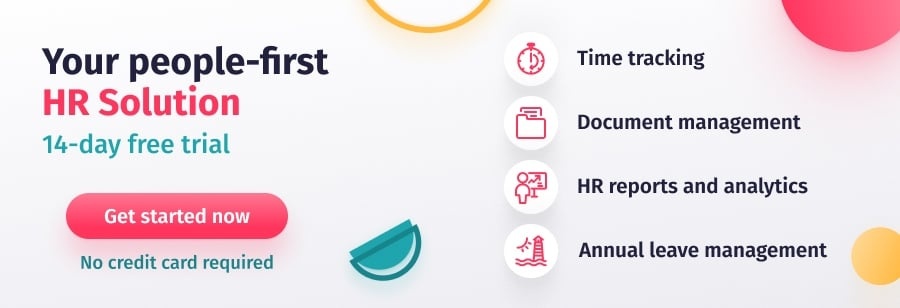Why are Talent Management Practices Important for Startups?
Talent management strategy has become increasingly important in the last decade, especially following the pandemic. The labour shortage in the UK and the US has meant companies are fighting for and struggling to retain talent. The Federation of Small Businesses has reported that as many as 80% of small firms faced difficulties recruiting applicants with suitable skills in the previous 12 months.
Start-ups must work out how to keep their teams engaged to stay innovative and profitable. If they can’t source or retain the talent they need, they will struggle to grow. On the other hand, getting it right can give start ups a strong competitive advantage.
In this article, we’ll discuss the key tenets of talent management strategy for startups and how to implement them effectively in your business.

Prioritise strategic workforce planning
Employee planning should be strategic and a priority in any business, but it is even more integral to a startup.
Planning your workforce as a startup will look very different to leading an established business. The goals and business objectives are ambitious, the teams are smaller, and people will be required to wear different hats and develop new skills, often on the job. In short, startup teams need to be agile, nimble and adaptable.
Your succession planning must also reflect that, keeping your business one step ahead from the very early stages of business development. Start with your business objectives and define what skills and attributes your need from your people to deliver that.
Here are some of the questions your should be asking:
- What are the business’s short-term and long-term goals? Map out a timeline and begin plotting the resources you’ll need for each stage. Your business strategies should go hand in hand with your talent strategy.
- What are the crucial roles you need to fill? Prioritise these in your hiring plans.
- How many employees do you need? And does your business support that projected growth?
- What do you want your organisational structure to look like? This will reflect in your company culture (more on this later), but decide what hierarchy, reporting lines and the departmental system will support your operations.
- How will you approach your hiring strategy? What talent pool will you be targeting? Ask yourself honestly if you have the knowledge and resources to do it yourself or need external help. Remember, some fantastic technology solutions are available to support your human resources function.
- How will you develop your current workforce? Think about how you might advance your team and improve their performance through learning and development.
- What are the risks you need to be aware of? Be mindful of the market and any issues that might arise.

Don't just focus on recruiting and attracting talent
Startups are about rapid growth. This can mean that sometimes the talent management focus can be all recruitment and attraction, leaving retention and performance as an afterthought. Startups are known for their high-pressure environments, and the high-risk, high-reward energy can be a big draw for recruits entering your workforce. However, it can also be part of why turnover is so high.
These are some of the biggest drivers for people leaving startups:
- Poor work-life balance
- Uncertainty and perceived lack of job security
- Lack of growth and development opportunities
- Inadequate compensation
- Feeling a lack of support or proper management
- Lack of recognition and rewards.
Employee retention should be central to your talent management strategy for several reasons.
1. Maintaining continuity and stability – No one is irreplaceable, but the departure of key players in a startup environment can be felt more acutely than in established businesses. Over time people develop deep knowledge and expertise of the company and industry they work in. Losing that, particularly when teams are small with little role crossover, can be a real blow. New employees typically go through an adjustment period, so it might take even longer to get back to where you were before their departure.
2. Reducing costs – Estimates of replacing an employee vary, but studies show it can be as much as 1.5 – 2X the team member’s annual salary. In its early stages, the likelihood of your startup being able to afford unnecessary recruitment costs is slim. It’s much more cost-effective to focus your efforts on developing and retaining your talent.
3. Boosting productivity. The departure of employees can disrupt the workflow of your other team members, especially when the teams are small and working together closely. It can also affect morale and impact employee trust if turnover is high. This can result in disengagement and falling productivity. In contrast, a low-turnover team will see productivity rise.
4. Building a positive workplace culture – Your people are the champions and pioneers of developing your company culture.

Get an expert involved
Let’s be honest. It’s unlikely that you’ll have the expertise or the knowledge to implement a talent management strategy to the standard of an industry professional. That’s unless your startup is an HR or talent management business, of course!
On top of this, as a business founder, you probably have a lot on your plate and lack the time and headspace to immerse yourself in the nuances of successful talent management for startups.
Remember – you can outsource help. Whether you seek some expert guidance from HR professionals or hire for a full-time talent management role, there are professionals out there who not only specialise in talent management, but talent management for startups.
Build and Promote Learning and Development Opportunities
According to research by the Association of Talent Development, companies that offer comprehensive learning and development programmes have 218% higher income per employee than companies without formalised training.
This is just one of the outcomes of a learning and development programme that align with the objectives of a startup. Building that culture of improvement into your business ensures your team continues to learn new skills and develop, keeping them competitive.
Startups and smaller organisations also often need to pivot quickly in response to market changes or new business opportunities. Learning and development initiatives enable employees to fill the necessary skills gaps and build their knowledge so they can adapt to these changes effectively. It is the bedrock for innovation and creativity and will give your teams the foundations to problem-solve and generate new ideas.
Aside from the more apparent benefits to your business, learning and development also increases team engagement.
Here are some pointers for building a learning and development programme for your start-up organisation:
- Don’t feel like you have to follow the rules – Startups will tend to have much more on-the-job learning than other organisations, and you can lean into that. Why don’t you try formalising your peer-to-peer learning? Create more shadowing opportunities and share knowledge, and reward employees for participating. This has the added effect of spreading knowledge across your teams and ensuring you are less reliant on individuals if they leave.
- Focus on the learning and development needs of your business and your employees – it’ll be more obvious to you what you think the business needs, but find out what your employees need too.
- Have some clear objectives learning and development objectives – If nothing else, this will help you understand whether your programme is successful. You can then make sure you’re improving your programme to suit the changing needs of your business.
- Communicate it to your employees – Make sure they know what’s available to them and encourage them to participate.

Make Sure You Have a Solid Compensation Structure
We mentioned earlier that adequate compensation is one of the biggest drivers for startup employee turnover. Addressing this doesn’t have to be about blanket pay rises, but it should be about transparency and fair recognition and reward for achievement.
Getting it right means increased employee motivation, productivity, and job satisfaction; it also means better retention and talent attraction.
Before you implement a compensation structure, there are some important things to consider, especially for startups. Here are some things to think about:
- Get input from your employees – They are the lifeblood of your organisation. They’re your most valuable asset, and your business couldn’t function without them. So it makes sense to compensate them fairly, and the easiest way to ensure you get that right is to ask them!
- Benchmark against competitors – If your pay scale is vastly different from your competitors, you might lose your employees to a better pay-check. Understanding the market is essential.
- Keep the system fair – Nothing will conjure resentment faster in a small team than perceived unfairness in pay. Decide on a system that treats everyone fairly, performance management, for example, and stick to it. Then make sure you’ve communicated it widely to your teams.
- Regularly review and update – Once your compensation structure is in place, it can be tempting to sit back and congratulate yourself on a job well done. But, as with most elements within a startup, these things are constantly changing. Ensure you’ve got an ear to the ground inside and outside your business, and schedule regular reviews to ensure your pay still reflects the needs of your business and your employees.
Have a Visible Career Path Trajectory
Lack of growth opportunities is another big challenge. People want to be able to map out their careers, which means businesses without clear career paths can see people leave in search of more clarity over their futures.
As a startup founder, this can leave you in a bit of a conundrum. The nature of the business can mean that when companies are so new, the trajectory of the business isn’t necessarily clear either!
A startup’s success is down to its adaptability and ability to deal with and embrace change, which, while being fun and exciting, can make it difficult for employees to see themselves in the business in a few years – let alone five or ten years down the line.
Even without creating a crystal clear roadmap for the future, there are some strategies you can put in place to help your teams see that their future with you is a priority and that they won’t get left behind on their career journeys.
- Encourage career conversations – Get people talking about their careers to you and their colleagues. Encouraging open discussion will ensure your employees know that their career prospects are important to you, and you’ll know who’ll be interested in a particular role when it comes up.
- Flip the focus back on your employees – Ask them what they want. Do their career goals align with the future of your business? Ask them what role they would like to have, and there might be an opportunity for you to create that.
- Communicate and document career pathways as they happen – Shout loudly and proudly about your team’s successes. Ensure your whole business knows when someone’s been promoted or changed their role, and help them understand what drove it. Keep a record of it; before you know it, you’ll have a selection of case studies representing how employees can move around in your business.
- Establish criteria for advancement – Whatever it’s based on, build a robust process, and make sure it’s consistent and fair. It will help your employees work towards moving forward, even if that path hasn’t been defined yet.
- Offer challenging assignments and projects – Give your employees opportunities to take on new challenges. Employees at Google are encouraged to spend up to 20% of their time on other projects that they think will most benefit the company. It was doing this long before it was the success it is today, and credit some of its most significant advances to the policy.

Define your Company Culture Early on
The reality is when your business is small; your culture will be changing continuously. New employees joining the business will have fresh ideas, and your staff’s personalities and team dynamics will shape your company culture daily.
However, establishing the core values your culture is based on is essential when you start your business. All businesses have a culture, whether you spend much time on it or let it develop independently. And once your culture is established, it’s challenging to change it later.
Start-ups are known for their open communication and flat hierarchies – is that what you want for your business?
Here’s how to get started:
- Define your values – This is all about building the foundations of your company culture and should be your guiding principles.
- Make sure it reflects the day-to-day experience of your employees – It’s all good and well to talk about strong culture, but if that’s not the day-to-day experience of your team, then something is wrong. Keep an open line of communication so you’re always on top of what’s happening on the ground.
- Reward values, behaviours and practises that champion your culture – Culture at its core is the repeated daily behaviours and attitudes in your business. You can encourage those who reflect your culture by rewarding them and having a zero-tolerance policy against the ones that don’t. You can even try building culture into your bonus structure.



